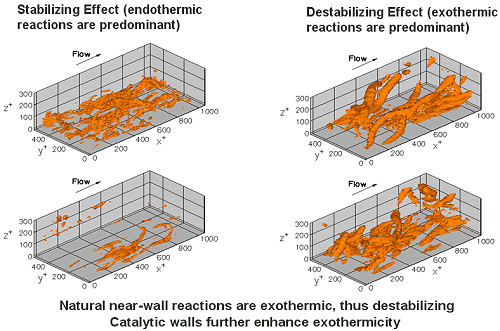Flow Physics: Turbulence and high-temperature physics
 |
|
Characterizing and predicting turbulent flows in thermo-chemical nonequilibrium is important for the design of future hypersonic vehicles and low-cost access to space. For the proposed flight conditions, the high- temperature environment (typical temperatures are greater than 2000 K and can reach well above 8000 K) causes chemical reaction, vibrational excitation, and ionization. These processes occur at finite rates which, when coupled with large convection speeds, cause the gas to be removed from thermo-chemical equilibrium. When the flow is turbulent, small fluctuations in the translational temperature result in large changes in the reaction rates. Our work has shown that under typical hypersonic conditions, a 5% turbulent fluctuation in temperature can cause a 30% fluctuation in the chemical composition of the gas. This significant difference from the characteristics of a laminar flow has important ramifications in the design of hypersonic flight technology, since the reaction rate and the chemical composition of the gas affect the aerothermal loading on the vehicle and the efficiency of proposed flow control techniques based on plasmadynamics and electromagnetics.
We are applying direct numerical simulation methodologies to perform controlled and exploratory studies regarding the interaction of real gas effects and turbulence. Our work has resulted in the report of a temperature fluctuation scaling for exothermic reactions in turbulent flows. The scaling appears general as it applies in isotropic turbulence and turbulent boundary layers at different flow conditions. Building on this, we are currently studying the effect of wall catalysis and preparing to consider the effect of ablative particles from the surface in the future.
